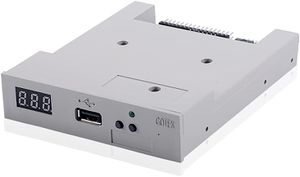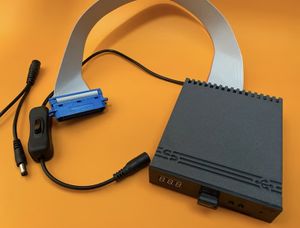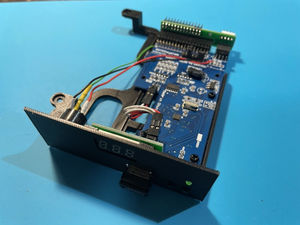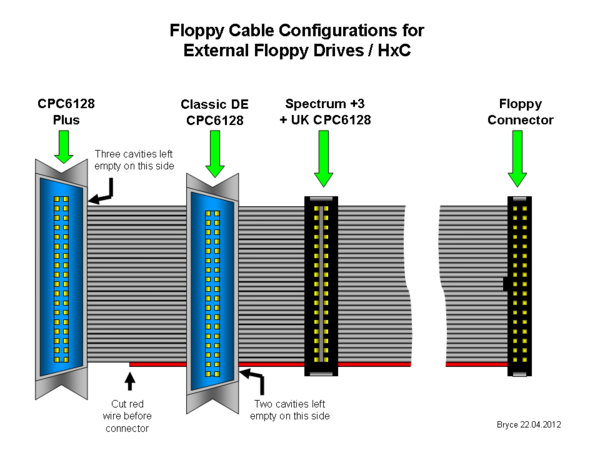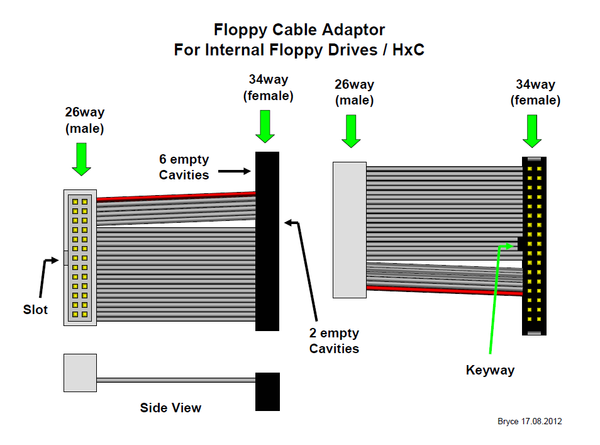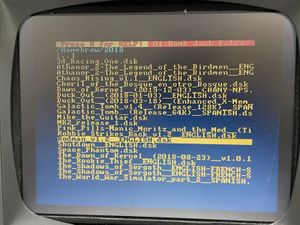Difference between revisions of "Gotek"
(→FlashFloppy firmware) |
m (→FlashFloppy firmware: Keir does no longer solicit donations (since 2021 actually)) |
||
| (11 intermediate revisions by 4 users not shown) | |||
| Line 1: | Line 1: | ||
| − | Gotek is a floppy | + | [[File:Gotek standard.jpg|thumb|right|Standard Gotek drive]] |
| + | [[File:Custom Gotek drive.jpg|thumb|right|Custom Gotek drive by [[Rodrik Studio]]]] | ||
| + | [[File:Gotek external.jpg|thumb|External GOTEK for a Schneider CPC 6128 with Centronics cable, 3D printed top cover and splitter cable to connect to the original 5V from the monitor]] | ||
| + | [[File:Gotek-internal.jpg|thumb|Internal GOTEK with 3D printed frame and 26/34 pin adapter PCB]] | ||
| + | |||
| + | == About the GOTEK == | ||
| + | |||
| + | GOTEK is a floppy drive emulator which can be directly attached to computers instead of a normal floppy drive. The drives are popular and cheap additions to many 80s and 90s computers including the Amstrad CPC. | ||
The basic Gotek has a 7-segment 2 digit display which shows the currently selected disk image, a USB socket for a USB memory stick, and 2 buttons to choose previous and next image. | The basic Gotek has a 7-segment 2 digit display which shows the currently selected disk image, a USB socket for a USB memory stick, and 2 buttons to choose previous and next image. | ||
| − | There are additional mods that can be | + | There are additional mods that can be added: |
* speaker (to simulate the sound of the read/write head stepping as heard in a real drive) | * speaker (to simulate the sound of the read/write head stepping as heard in a real drive) | ||
* eject button | * eject button | ||
| Line 9: | Line 16: | ||
* LCD/OLED display (this shows more information including the name of the image) | * LCD/OLED display (this shows more information including the name of the image) | ||
| − | + | The most recent version of the GOTEK (SFRKC30.AT4.35, based on the AT32F435 chip) usually already comes with OLED display and rotary encoder but is also more expensive than the basic models. | |
| − | + | ||
| − | + | ||
| − | + | ||
| − | + | In addition to the GOTEK you also need | |
| + | * 5V power (e.g. USB power supplies will work - or you can use the monitor's 5V power output with a Y-splitter cable) | ||
| + | * a 34pin ribbon cable to connect it to the CPC (e.g. an old PC floppy cable which has both 3.5" and 5.25" connectors) | ||
| + | * connector cable to update firmware of the GOTEK (depends on firmware type) | ||
| − | CPC Disk images are put onto a USB drive which is | + | CPC Disk images are put onto a USB drive which is plugged into the front of the Gotek. On the GOTEK a disk image is selected (via buttons or rotary encoder) and then the GOTEK behaves almost exactly as if it is a normal drive connected to the CPC with the disk being inserted. |
| − | + | There is only a small difference compared to a real drive with older models: the disc motor signal is not connected internally to the Gotek. This means the ready signal will be active even if the disc motor is off. The new model SFRKC30.AT4.35 can pass the motor signal and reacts (delayed if wanted) to it for the ready signal. See below for FlashFloppy firmware. | |
| − | + | The GOTEK can replace the internal drive of the 664/6128, e.g. if the internal drive is broken. Or it can be used as the external drive B. It can even work as a 3.5" or 5.25" drive for example with Parados or VDOS. | |
| − | == | + | == Firmware Update == |
| − | There is a version of the HxC Floppy Emulator firmware that can be used on the Gotek. It must be purchased from the HxC website and can then be installed and used. | + | Before the GOTEK can be used with the Amstrad CPC it needs to be flashed with a custom firmware. |
| + | |||
| + | The process depends on the type and firmware and is documented on the homepages of the respective firmwares (see below). | ||
| + | |||
| + | ===HxC Floppy Emulator firmware=== | ||
| + | |||
| + | There is a version of the [https://hxc2001.com HxC Floppy Emulator] firmware that can be used on the Gotek. It must be purchased from the HxC website and can then be installed and used. | ||
The firmware supports multiple computers and their disk image formats as well as the HFE v1 & v3 file formats. | The firmware supports multiple computers and their disk image formats as well as the HFE v1 & v3 file formats. | ||
| Line 30: | Line 43: | ||
Once the firmware has been installed into a Gotek it can be updated through the USB memory stick. | Once the firmware has been installed into a Gotek it can be updated through the USB memory stick. | ||
| − | ==FlashFloppy firmware== | + | ===FlashFloppy firmware=== |
| − | FlashFloppy is | + | [https://github.com/keirf/FlashFloppy FlashFloppy] is probably the most popular firmware for the GOTEK. It's well supported by the author Keir Fraser and [https://github.com/keirf/flashfloppy/blob/master/COPYING completely free]. |
The firmware supports multiple computers and their disk image formats. | The firmware supports multiple computers and their disk image formats. | ||
| − | + | Firmware installation is more easy than HxC firmware and only needs a USB-A to USB-A cable and the use of the original software of the microcontroller vendor to install the firmware. The process is very well documented on the FlashFloppy wiki. | |
| − | + | Once installed further updates can be performed via the USB memory stick. | |
| − | + | ||
| − | + | ||
| − | + | ||
| − | + | ||
| − | + | ||
| − | + | ||
| − | + | ||
| − | + | ||
| − | + | ||
| − | + | ||
| − | + | ||
| − | + | ||
| − | + | ||
| − | + | ||
| − | + | ||
| − | + | ||
| − | + | ||
| + | On the CPC, the following FF.cfg setting can be recommended: | ||
| + | |||
| + | <pre> | ||
| + | # Floppy-drive interface mode | ||
| + | interface = shugart | ||
| + | |||
| + | # Host platform | ||
| + | host = unspecified | ||
| + | |||
| + | # Pins 2 & 34 output (drive->host) manual configuration | ||
| + | pin02 = high | ||
| + | pin34 = rdy | ||
| + | |||
| + | # Rotational offset of disk after a track change | ||
| + | track-change = realtime | ||
| + | |||
| + | # Rotational offset of disk after draining a write to Flash | ||
| + | write-drain = realtime | ||
| + | |||
| + | # Index pulses suppressed when RDATA and WDATA inactive? | ||
| + | index-suppression = yes | ||
| + | |||
| + | # Milliseconds from head-step start to RDATA active. | ||
| + | head-settle-ms = 12 | ||
| + | |||
| + | # Milliseconds delay from motor-on to drive ready. | ||
| + | motor-delay = 200 | ||
| + | </pre> | ||
The rest of the settings can be used to your liking as they depend on preference and not on hardware emulation. | The rest of the settings can be used to your liking as they depend on preference and not on hardware emulation. | ||
| + | |||
| + | == Models == | ||
The best Gotek to buy currently (12/22) is the Model SFRKC30.AT4.35. | The best Gotek to buy currently (12/22) is the Model SFRKC30.AT4.35. | ||
| − | |||
| − | |||
| − | + | This model features a Artery AT32F435 APU and as well a motor jumper. This completes the emulation as it simulates the motor spin-up time. They are usually offered with Rotary encoder and with OLED display. | |
| − | For | + | On the CPC also the AT32F415 models can be a good alternative. They are cheaper and can be upgraded with rotary encoder and OLED display. |
| + | |||
| + | For full details on which models to use and which to avoid, see here: | ||
[https://github.com/keirf/flashfloppy/wiki/Gotek-Models Gotek models on Flashfloppy wiki] | [https://github.com/keirf/flashfloppy/wiki/Gotek-Models Gotek models on Flashfloppy wiki] | ||
| − | + | ==Physical connection== | |
| + | |||
| + | ===CPC 464 / DDI=== | ||
| + | |||
| + | You can directly connect the GOTEK to the DDI-1 cable connector however you would need to cut off the noses on the bottom of the cable - or you use a short IDC extension cable to avoid cutting of the noses. Please keep in mind that the DDI-1 is powered by the original FD-1 3" drive so you still need the FD-1 or need to power the DDI-1 via an alternative method. | ||
| + | |||
| + | ===CPC 664 / 6128 external=== | ||
| + | |||
| + | A 34 pin IDC floppy cable as used in old PCs is perfect. If it even has a 5.25" edge connector you can use it directly. | ||
| + | |||
| + | For German Schneider/Amstrad 6128 models you will need a Centronics connector instead of the edge connector. | ||
| + | |||
| + | The 6128 Plus also needs a Centronics connector but with a slightly different pinout. | ||
| + | |||
| + | [[Image:Floppy_Cable.png|600px|centre]] | ||
| + | |||
| + | For full details look here: [[DIY:Floppy_Drives#Multi-Adaptor_Cable_for_External_Floppies_.2F_HxC_emulator]] | ||
| + | |||
| + | ===CPC 664 / 6128 internal=== | ||
| + | |||
| + | You can also use the GOTEK as a replacement for a broken 3" drive, just make sure to set the jumper on the GOTEK from S1 to S0. | ||
| + | |||
| + | As the GOTEK has a 34pin connector but the 3" drives have a 26pin connector you will also need a [[DIY:Floppy_Drives#Adaptor_Cable_for_Internal_Floppies_.2F_HxC_emulator|26 to 34 pin adapter]]. | ||
| + | |||
| + | [[Image:Internal_HxC_Cable.png|600px|centre]] | ||
| + | |||
| + | PCB versions of this adapters that can be directly connected to a GOTEK are often also sold on e.g. Ebay. | ||
| + | |||
| + | You will also need a (3D printed) frame to properly mount the GOTEK in your CPC. You can find 3D models on the usual websites, e.g. Thingiverse. Remember to look for the right frame for your CPC model as the 664, 6128 and Plus all require different frames. | ||
| + | |||
| + | ==HXC Manager== | ||
| + | |||
| + | Despite its name this software works with both FlashFloppy and HxC firmware. | ||
| + | |||
| + | Especially when using the 3 digit display the [https://norecess464.weebly.com/hxc-manager-v4.html HxC Manager] offers a great alternative to organise and mount DSK images. You can select 20 images and assign them to 20 slots which you navigate via the up/down buttons on the GOTEK. | ||
| − | + | [[File:Hxcmanager.jpg|thumbnail|none]] | |
==Related== | ==Related== | ||
* [[HxC_Floppy_Emulator|HxC Floppy Emulator]] | * [[HxC_Floppy_Emulator|HxC Floppy Emulator]] | ||
| + | * [[FlashFloppy]] | ||
| + | * [[ABBA_switch|ABBA switch - switch drive A to B and B to A]] | ||
| + | * [[Guide_on_how_to_connect_a_3.5#Primary_drive_setting_.28OPTIONAL.29|Forcing drive B to be Drive A]] | ||
==Links== | ==Links== | ||
* [https://github.com/keirf/FlashFloppy FlashFloppy on github] | * [https://github.com/keirf/FlashFloppy FlashFloppy on github] | ||
* [https://github.com/keirf/flashfloppy/wiki/Gotek-Models Gotek models on Flashfloppy wiki] | * [https://github.com/keirf/flashfloppy/wiki/Gotek-Models Gotek models on Flashfloppy wiki] | ||
| + | * [https://norecess464.weebly.com/hxc-manager-v4.html HxC Manager] | ||
* [https://hxc2001.com/ HxC Floppy Emulator Homepage] | * [https://hxc2001.com/ HxC Floppy Emulator Homepage] | ||
* [http://www.cpcwiki.eu/forum/applications/cubeios-fat16fat32-rom-for-the-cpc's-with-xmass/ OS-Support] | * [http://www.cpcwiki.eu/forum/applications/cubeios-fat16fat32-rom-for-the-cpc's-with-xmass/ OS-Support] | ||
| + | * [https://youtu.be/QSLcgWLRztE Un Gotek sur CPC 664/6128 sans rien démonter] by [[Rodrik Studio]] | ||
| + | * [https://youtu.be/E3raN1yi54c L'ultime Gotek que j'ai dessiné pour CPC] by [[Rodrik Studio]] | ||
[[Category:Peripherals]] [[Category:DIY]][[Category:DATA Storage]] [[Category:Emulator]] | [[Category:Peripherals]] [[Category:DIY]][[Category:DATA Storage]] [[Category:Emulator]] | ||
Latest revision as of 03:43, 30 July 2025
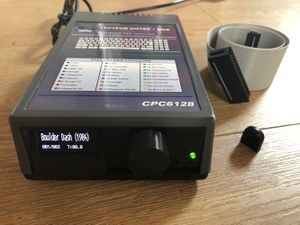
Contents
About the GOTEK
GOTEK is a floppy drive emulator which can be directly attached to computers instead of a normal floppy drive. The drives are popular and cheap additions to many 80s and 90s computers including the Amstrad CPC.
The basic Gotek has a 7-segment 2 digit display which shows the currently selected disk image, a USB socket for a USB memory stick, and 2 buttons to choose previous and next image.
There are additional mods that can be added:
- speaker (to simulate the sound of the read/write head stepping as heard in a real drive)
- eject button
- rotary dial (turn the dial to select the disc image)
- LCD/OLED display (this shows more information including the name of the image)
The most recent version of the GOTEK (SFRKC30.AT4.35, based on the AT32F435 chip) usually already comes with OLED display and rotary encoder but is also more expensive than the basic models.
In addition to the GOTEK you also need
- 5V power (e.g. USB power supplies will work - or you can use the monitor's 5V power output with a Y-splitter cable)
- a 34pin ribbon cable to connect it to the CPC (e.g. an old PC floppy cable which has both 3.5" and 5.25" connectors)
- connector cable to update firmware of the GOTEK (depends on firmware type)
CPC Disk images are put onto a USB drive which is plugged into the front of the Gotek. On the GOTEK a disk image is selected (via buttons or rotary encoder) and then the GOTEK behaves almost exactly as if it is a normal drive connected to the CPC with the disk being inserted.
There is only a small difference compared to a real drive with older models: the disc motor signal is not connected internally to the Gotek. This means the ready signal will be active even if the disc motor is off. The new model SFRKC30.AT4.35 can pass the motor signal and reacts (delayed if wanted) to it for the ready signal. See below for FlashFloppy firmware.
The GOTEK can replace the internal drive of the 664/6128, e.g. if the internal drive is broken. Or it can be used as the external drive B. It can even work as a 3.5" or 5.25" drive for example with Parados or VDOS.
Firmware Update
Before the GOTEK can be used with the Amstrad CPC it needs to be flashed with a custom firmware.
The process depends on the type and firmware and is documented on the homepages of the respective firmwares (see below).
HxC Floppy Emulator firmware
There is a version of the HxC Floppy Emulator firmware that can be used on the Gotek. It must be purchased from the HxC website and can then be installed and used.
The firmware supports multiple computers and their disk image formats as well as the HFE v1 & v3 file formats.
Once the firmware has been installed into a Gotek it can be updated through the USB memory stick.
FlashFloppy firmware
FlashFloppy is probably the most popular firmware for the GOTEK. It's well supported by the author Keir Fraser and completely free.
The firmware supports multiple computers and their disk image formats.
Firmware installation is more easy than HxC firmware and only needs a USB-A to USB-A cable and the use of the original software of the microcontroller vendor to install the firmware. The process is very well documented on the FlashFloppy wiki.
Once installed further updates can be performed via the USB memory stick.
On the CPC, the following FF.cfg setting can be recommended:
# Floppy-drive interface mode interface = shugart # Host platform host = unspecified # Pins 2 & 34 output (drive->host) manual configuration pin02 = high pin34 = rdy # Rotational offset of disk after a track change track-change = realtime # Rotational offset of disk after draining a write to Flash write-drain = realtime # Index pulses suppressed when RDATA and WDATA inactive? index-suppression = yes # Milliseconds from head-step start to RDATA active. head-settle-ms = 12 # Milliseconds delay from motor-on to drive ready. motor-delay = 200
The rest of the settings can be used to your liking as they depend on preference and not on hardware emulation.
Models
The best Gotek to buy currently (12/22) is the Model SFRKC30.AT4.35.
This model features a Artery AT32F435 APU and as well a motor jumper. This completes the emulation as it simulates the motor spin-up time. They are usually offered with Rotary encoder and with OLED display.
On the CPC also the AT32F415 models can be a good alternative. They are cheaper and can be upgraded with rotary encoder and OLED display.
For full details on which models to use and which to avoid, see here: Gotek models on Flashfloppy wiki
Physical connection
CPC 464 / DDI
You can directly connect the GOTEK to the DDI-1 cable connector however you would need to cut off the noses on the bottom of the cable - or you use a short IDC extension cable to avoid cutting of the noses. Please keep in mind that the DDI-1 is powered by the original FD-1 3" drive so you still need the FD-1 or need to power the DDI-1 via an alternative method.
CPC 664 / 6128 external
A 34 pin IDC floppy cable as used in old PCs is perfect. If it even has a 5.25" edge connector you can use it directly.
For German Schneider/Amstrad 6128 models you will need a Centronics connector instead of the edge connector.
The 6128 Plus also needs a Centronics connector but with a slightly different pinout.
For full details look here: DIY:Floppy_Drives#Multi-Adaptor_Cable_for_External_Floppies_.2F_HxC_emulator
CPC 664 / 6128 internal
You can also use the GOTEK as a replacement for a broken 3" drive, just make sure to set the jumper on the GOTEK from S1 to S0.
As the GOTEK has a 34pin connector but the 3" drives have a 26pin connector you will also need a 26 to 34 pin adapter.
PCB versions of this adapters that can be directly connected to a GOTEK are often also sold on e.g. Ebay.
You will also need a (3D printed) frame to properly mount the GOTEK in your CPC. You can find 3D models on the usual websites, e.g. Thingiverse. Remember to look for the right frame for your CPC model as the 664, 6128 and Plus all require different frames.
HXC Manager
Despite its name this software works with both FlashFloppy and HxC firmware.
Especially when using the 3 digit display the HxC Manager offers a great alternative to organise and mount DSK images. You can select 20 images and assign them to 20 slots which you navigate via the up/down buttons on the GOTEK.
Related
- HxC Floppy Emulator
- FlashFloppy
- ABBA switch - switch drive A to B and B to A
- Forcing drive B to be Drive A
